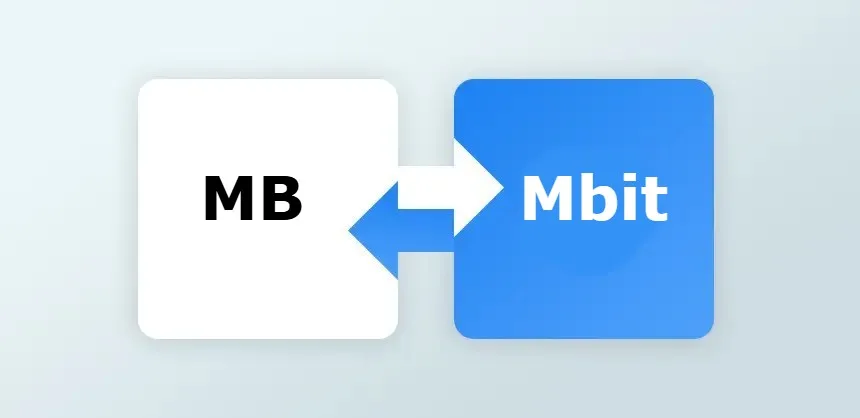Megabytes to Megabits Converter - Convert Data Size to Network Speed
Convert between megabytes (MB) and megabits (Mbit) for storage calculations, download times, and data transfer planning. Understand real-world implications for file transfers, streaming, and backup operations.
Enter the number of megabytes (MB) to convert
Conversion Results
Enter value in megabytes to see conversion results
Related & Other Popular Converters
Convert Megabytes to Megabits (MB to Mbit) easily and accurately using our free online converter. Use this MB to Mbit converter whether you are measuring download speed, evaluating data transfer rates, or comparing file sizes- our MB to Mbit converter provides immediate, accurate answers.
It's important to understand the difference between Megabytes (MB) and Megabits (Mbit) so that you can accurately calculate your bandwidth, evaluate streaming quality, and analyze network performance.

What is a Megabyte (MB)?
The Megabyte (MB) is used for measuring digital information storage and is often used to measure the size of files i.e. photos, videos, and programs.
This means that when data is transferred over the network, it is often measured in Megabits per second (Mbit/sec) not Megabytes. Understanding the difference between a Megabyte (MB) and a Megabit (Mbit) is vital to understanding how to convert Megabytes to Megabits (Mbit).
How to Convert Megabytes to Megabits
The formula to convert Megabytes to Megabits is simple:
Megabits (Mbit) = Megabytes (MB) x 8
Example:
If you have 100 MB, the conversion would be:
100 MB x 8 = 800 Mbit
Our smart MB to Mbit converter performs this calculation instantly and accurately for you - eliminating manual effort or confusion.
Why Use Our MB to Mbit Converter?
Our Megabytes to Megabits converter is easy to use and accurate. Its purpose is to help you navigate from file sizes to network speeds for various usages, including:
For gamers, video editors, developers, or IT experts, this megabyte to megabit converter provides you with an accurate way to calculate.
Conversion Table - Megabytes to Megabits
| Megabytes (MB) | Megabits (Mbit) |
|---|---|
| 1 MB | 8 Mbit |
| 10 MB | 80 Mbit |
| 50 MB | 400 Mbit |
| 100 MB | 800 Mbit |
| 500 MB | 4000 Mbit |
| 1000 MB (1 GB) | 8000 Mbit |
Use this table for quick manual reference, or try our MB to Mbit converter for automatic conversion.
How Accurate is the Conversion?
This Megabytes to Megabits converter is based on the binary standard for data, where:
1 MB = 1,048,576 bytes, and
1 byte = 8 bits.
Because this converter uses proper calculations, you can be sure the results are accurate and reliable for both technical purposes and educational purposes.
Common Uses of Megabytes to Megabits Conversion
In all cases the megabyte to megabit converter simplifies the process.
The Megabytes to Megabits converter is a convenient application to quick and accurately convert between MB and Mbit. Use this tool to convert between MB and Mbit when you need to compute data transfer rates, compare internet rate plans, or otherwise minimize and understand storage usage effectively.
Try this MB to Mbit converter now and simplify your understanding of digital data more quickly than ever.
FAQs
There are 8 Megabits in 1 Megabyte. To convert Megabytes to Megabits simply multiply by 8 Megabits for 1 Megabyte.
Internet service providers (ISPs) use Megabits per second (Mbps) because it gives you a clearer idea of the data transfer rates, rather than the size of the storage. Megabytes (MB) are generally used for file sizes.
Yes it is. Using the formula, (MB x 8 = Mbit), 100 MB = 800 Mbit.
Simply enter the desired Megabytes value, and the above converter will instantly translate it into corresponding Megabits value using the binary standard.
MBps (Megabytes per second) measure in bytes, while Mbps (Megabits per second) measure in bits. Since 1 byte = 8 bits, 1 MBps = 8 Mbps.
Yes! - You can easily flip the process. Simply divide Megabits by 8, to get Megabytes. For example, 800 Mbit ÷ 8 = 100 MB.